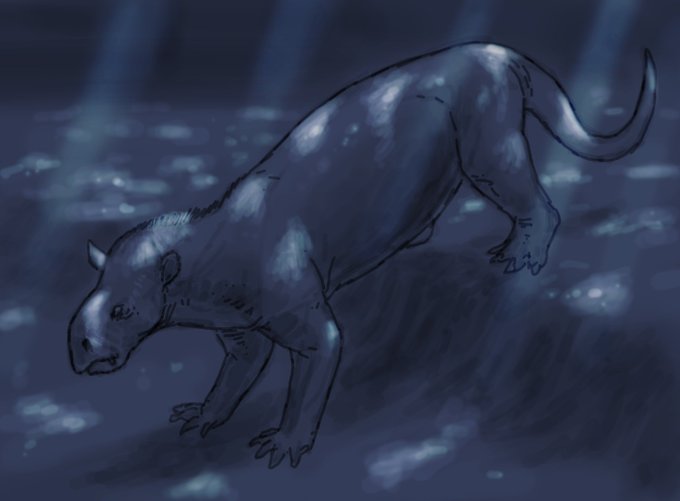pycnoのTwitterイラスト検索結果。 55 件中 3ページ目
Sea spiders (Pycnogonida) shared unsual body plan that their bodies are almost just legs, even their guts were branched and associated within each of them. They are not spiders nor even arachnids, instead they most likely arose from a very basal chelicerate lineage.
#Arthrogirls
We've just reached our Pycnonemosaurus stretch goal! Thank you so much to everyone who has supported the project thus far. Check out the newly revealed stretch goal!
#pathoftitans #dinosaurs #Pycnonemosaurus #indiegamedev #stretchgoal
One specimen of Gladocephaloideus is so complete and well-preserved that it even includes traces of hair-like pycnofibers. https://t.co/YqOBxq3WB0
Pterosaur feathers
by @JoschuaKnuppe
Pterosaurs are known to have been covered in hair-like pycnofibers. Two specimens of anurognathids show that some pycnofibers were brush- or tuft-shaped and probably share an evolutionary origin with feathers.
https://t.co/t8rAmwEbQq
...Stenoprotome, Brebodus and Gladiopycnodus.
#paleostream #paleoart #sciart #fish #paleontology
Sordes was a small flying reptile from the Jurassic. It had wing membranes attached to the legs and between the legs and pycnofibres (hair-like filaments) covered its body.
(Credit: Dmitry Bogdanov, paleopeter)
Results from the last #paleostream of the year 2018! Rhabdodon, Paleorhinus, Prodrinoceras, Rostropycnodus. #paleoart #sciart #dinosaurs #NewYearsEve
Pterosaur pycnofibres suggest feathers are not limited to maniraptoran dinosaurs: Yang et al in @NatureEcoEvo
https://t.co/O2kfL8DcW7
Free-to-read: https://t.co/9HyVBpvjjr
Results from a very quick... failed stream. I hope I can fix this until the release of the book. Don't know what happened... anyway. We have here Pycnonemosaurus, Desmatosuchus and Ikrandraco. #paleostream #paleoart #FossilFriday #sciart #dinosaur
Another #SundayFishSketch! This time Eomesodon, a beast that was able to grow surprisingly huge for a pycnodont. I saw a original in Solnhofen, especially impressive because one is able to the the sculpture of the scales which are usually too small to notice. #Paleoart #Sciart
And another pycnodont! This genus, Stenoprotome, is mostly known for dorsally preserved parts of the head, but in combination with the few lateral preserved parts, and material from related genera, they let us paint an absurd picture. #Paleoart #SundayFishSketch
Let's continue. Gladiopycnodus is probably the best #fish when you search for some alien spaceship inspiration, the armored belly and back, long rostrum and of course the huge anal spines can't be ignored. #SundayFishSketch #Paleoart
Very few #paleoartists work on fish regularly, but even clades you would think are pretty normal can have amazing members, and in the case of pycnodonts we actually have several families of super weird fish. Rostropycnodus is just one of the medium weird guys. #SundayFishSketch







































